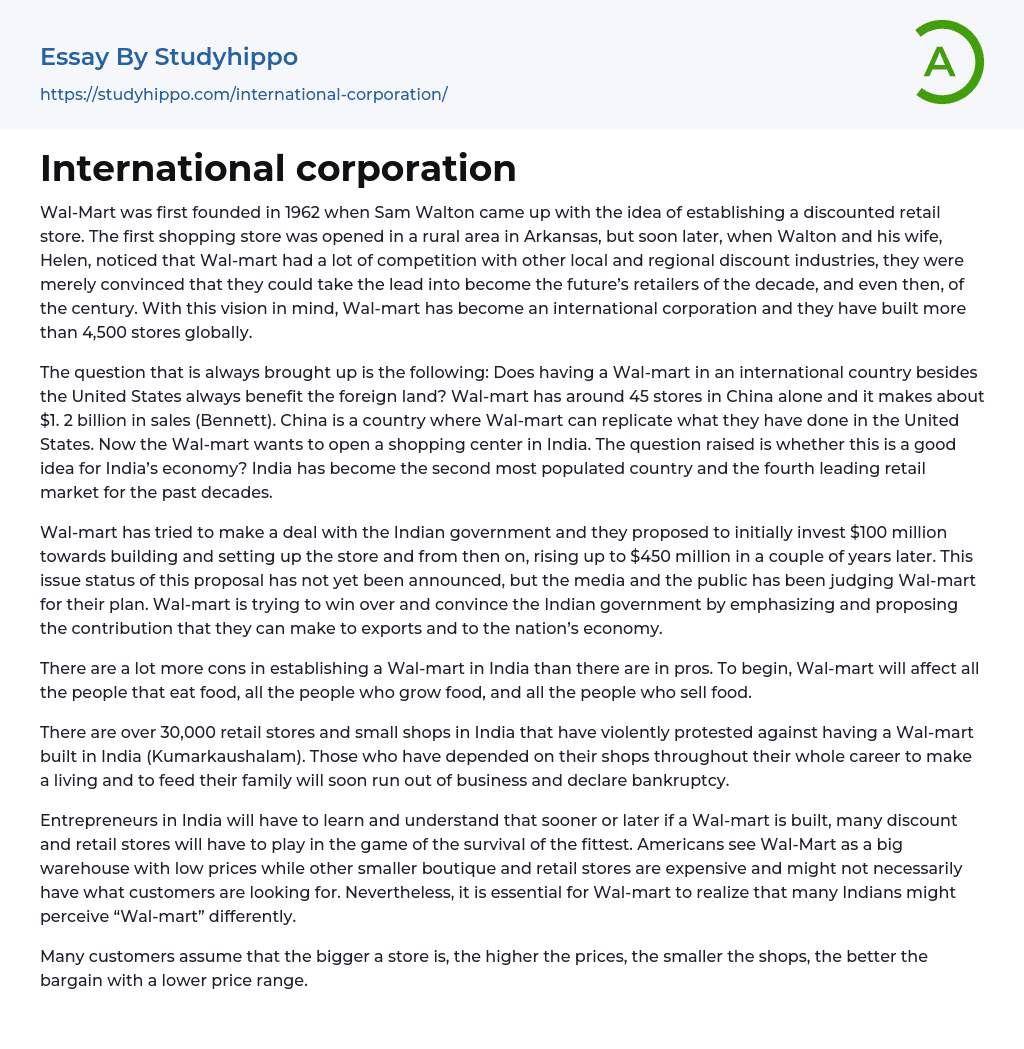Wal-Mart was first founded in 1962 when Sam Walton came up with the idea of establishing a discounted retail store. The first shopping store was opened in a rural area in Arkansas, but soon later, when Walton and his wife, Helen, noticed that Wal-mart had a lot of competition with other local and regional discount industries, they were merely convinced that they could take the lead into become the future’s retailers of the decade, and even then, of the century. With this vision in mind, Wal-mart has become an international corporation and they have built more than 4,500 stores globally.
The question that is always brought up is the following: Does having a Wal-mart in an international country besides the United States always benefit the foreign land? Wal-ma
...rt has around 45 stores in China alone and it makes about $1. 2 billion in sales (Bennett). China is a country where Wal-mart can replicate what they have done in the United States. Now the Wal-mart wants to open a shopping center in India. The question raised is whether this is a good idea for India’s economy? India has become the second most populated country and the fourth leading retail market for the past decades.
Wal-mart has tried to make a deal with the Indian government and they proposed to initially invest $100 million towards building and setting up the store and from then on, rising up to $450 million in a couple of years later. This issue status of this proposal has not yet been announced, but the media and the public has been judging Wal-mart for their plan. Wal-mart is trying
to win over and convince the Indian government by emphasizing and proposing the contribution that they can make to exports and to the nation’s economy.
There are a lot more cons in establishing a Wal-mart in India than there are in pros. To begin, Wal-mart will affect all the people that eat food, all the people who grow food, and all the people who sell food.
There are over 30,000 retail stores and small shops in India that have violently protested against having a Wal-mart built in India (Kumarkaushalam). Those who have depended on their shops throughout their whole career to make a living and to feed their family will soon run out of business and declare bankruptcy.
Entrepreneurs in India will have to learn and understand that sooner or later if a Wal-mart is built, many discount and retail stores will have to play in the game of the survival of the fittest. Americans see Wal-Mart as a big warehouse with low prices while other smaller boutique and retail stores are expensive and might not necessarily have what customers are looking for. Nevertheless, it is essential for Wal-mart to realize that many Indians might perceive “Wal-mart” differently.
Many customers assume that the bigger a store is, the higher the prices, the smaller the shops, the better the bargain with a lower price range.
- Activism essays
- Communism essays
- Conservatism essays
- Liberalism essays
- Marxism essays
- Nationalism essays
- Patriotism essays
- Policy essays
- Public Policy essays
- Social Contract essays
- Socialism essays
- Totalitarianism essays
- American Dream essays
- Barriers To Entry essays
- Capitalism essays
- Central Bank essays
- Compensation essays
- Consumerism essays
- Economic Development essays
- Economic Growth essays
- Economic Inequality essays
- Economic System essays
- Economy essays
- Employment essays
- Export essays
- Finance essays
- Free Trade essays
- Gross Domestic Product essays
- Human Development essays
- Income Inequality essays
- Industry essays
- Inflation essays
- International Business essays
- International Trade essays
- Macroeconomics essays
- Materialism essays
- Max Weber essays
- Microeconomics essays
- Minimum Wage essays
- Monetary Policy essays
- Monopoly essays
- Pricing essays
- Profit essays
- Recession essays
- resources essays
- Taxation essays
- Trade essays
- Unemployment essays
- Warehouse essays
- World economy essays




